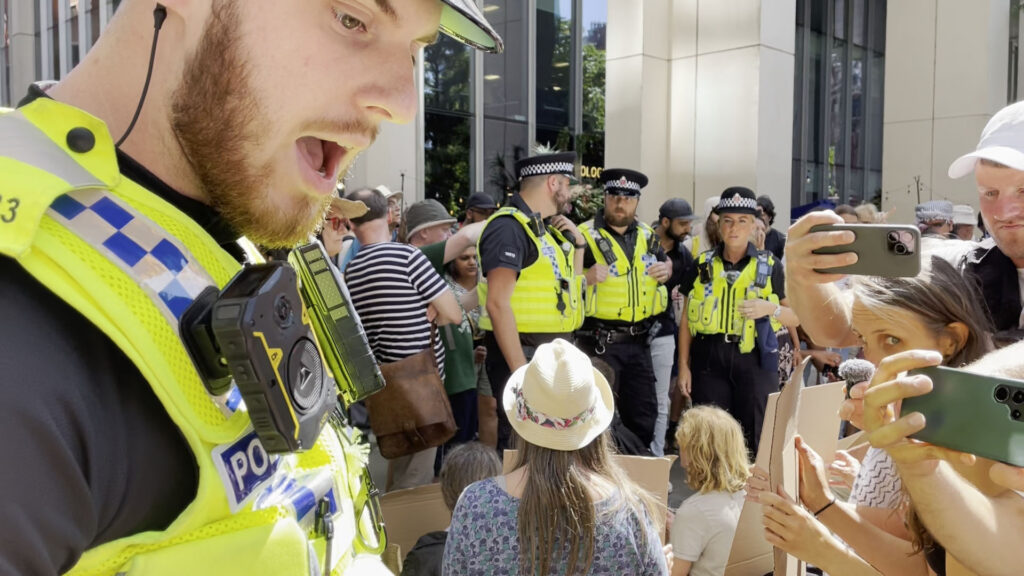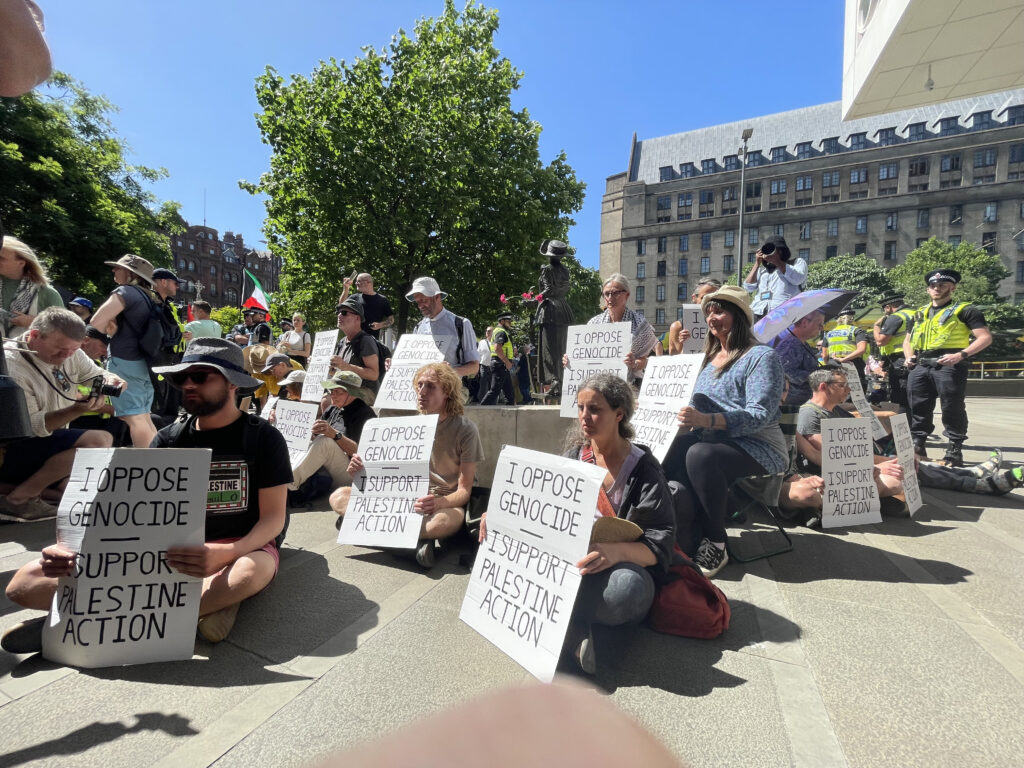Guest report by Rebecca Harrison, freelance journalist
Demonstrators organising through Defend Our Juries arrive at the Emily Pankhurst statue in St Peter’s Square, Manchester, in the baking afternoon heat. It’s 29° Celsius in the sun – and there is no shade here.
The city centre is busy despite the climate-crisis temperature. There are the customary stag and hen parties on drinking sprees, shoppers checking out the sales, and thousands of Oasis fans who have come to queue for merch at the official store en route to the venue for tonight’s gig. Protestors supporting Palestine have just walked across town, sending their percussive demands into the clammy, oppressive air for an end to Israeli genocide in Gaza.
Suffice to say, there are police. They are everywhere, their cars blocking roads around protestors, their too-yellow uniforms almost too-bright in the sun. There is a police van waiting in anticipation for 16 demonstrators who shortly will state their commitment to peace and freedom of expression. There are three police officers standing near the Pankhurst statue as another protest calling for an end to conflict—this one led by Ukrainians—takes place on the other side of suffragette’s likeness.
There are also far-right vloggers (mostly Youtubers who espouse anti-immigrant, transphobic, and other views typically recognised on the left as far-right), who are lying in wait with selfie sticks, henchmen, and vitriol.
Shortly after 2.30pm, the demonstrators—sitters—take up their positions. Quietly, they position themselves on the ground, or on the hot stone wall that encircles the statue. They hold cardboard signs that read ‘I oppose genocide. I support Palestine Action.’
Palestine Action Proscribed
While governments and institutions across the Global North make opposition to Israel’s genocide ever-more challenging—with the UK, USA, Canada, and Germany among those trying to silence those of us who want a free Palestine—it is the demonstrators’ support for Palestine Action that is most contentious.
Palestine Action is an activist group that has maintained peaceful strategies of resistance in direct actions against the UK’s supply of military equipment to Israel. On June 20, 2025, members of the group entered a Royal Air Force (RAF) base and spray painted two planes with red paint, leaving behind a Palestinian flag. Their action is reminiscent of tactics deployed by the women of Greenham Common, who between 1981 and 2000 staged a number of trespasses onto the US Air Force Base in Berkshire to protest against nuclear armament. Those women, of course, experienced police brutality and criminal prosecutions.
But Keir Starmer, Home Secretary Yvette Cooper, and other politicians are not content with the powers already at their disposal to punish Palestine Action protestors. Despite widespread condemnation from civil liberties groups, charities, activists, the public, lawyers—and even some politicians—on July 8, Cooper announced that the government had added Palestine Action to the UK list of proscribed terrorist organisations under the Terrorism Act (2000). A legal challenge to overturn the UK government’s proscription of Palestine Action is underway, supported by solicitors at Birnberg Peirce Ltd. In the meantime, demonstrating support for the group now carries significant penalties, including up to 14 years’ imprisonment if found guilty in a criminal court.
Demonstrators in Manchester—16 people among the 71 who will today show support for Palestine Action across the UK today, including in London, Derry, Cardiff, and Leeds—face an uncertain response from police, and an uncertain future if charged. They gather around an effigy depicting one of Britain’s best-known campaigners for women’s suffrage. Unlike the now-revered Pankhurst, the demonstrators here do not use militant tactics.
Instead they sit, some meditatively, with their eyes lowered to the ground in silent contemplation for their anticipated hour-long protest. Some are statuesque. Some quiver almost imperceptibly with nerves. Some wear dog-collars indicating office in the church. Others express no religion. They are of many ages. What unites them is their belief in the right to live, and the right to freedom of expression. They all remain composed as the corner of the square around the statue explodes into a maelstrom of far-right and police violence.
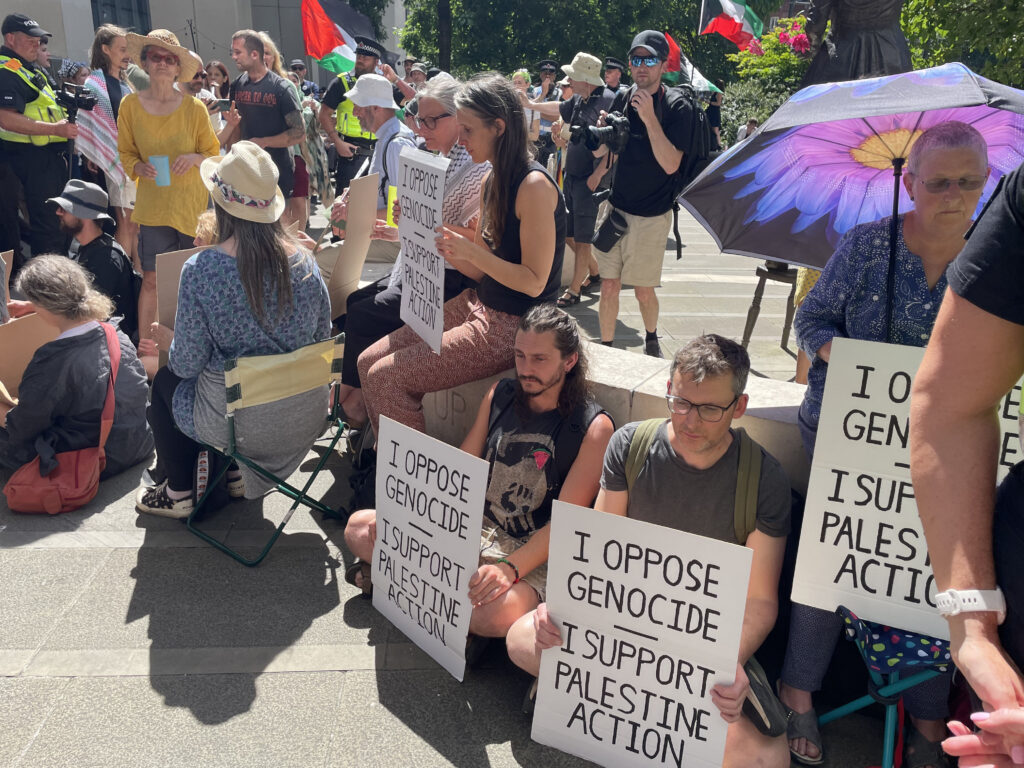
Resisting the far-right
Immediately that the demonstrators sit down, far-right vloggers swoop in to goad, heckle, and abuse. Mostly men, some of the more prominent online figures among them have arrived with bodyguards. Ostensibly there to shield the (typically tall or well-built) frontmen from some indeterminate harm, their protectors waste no time in pushing and shoving those of us who are gathered around the statue to observe or report on the demonstration.
Within seconds of the sit-in beginning, the far-right raise their voices to decry ‘terrorism,’ to espouse Zionist and fascist views, and encourage officers to arrest demonstrators. They barge into the crowd indiscriminately, taking no care to hide their aggression or assaults on people from the police. (When one of them shoved me mere inches from the police line, and then threatened me with violence for being press, the policewoman who witnessed the incident refused to acknowledge it or intervene). Vloggers swarm the sitters as if to force them to retaliate by shoving microphones and cameras in their faces. ‘Poison priest!’ one of them calls out, as others talk of westerners’ apparent “self-hatred”. But the demonstrators’ resolve is unwavering. They remain committed to their cause.
The situation escalates quicker than any I’ve witnessed at a protest before. Unable to get a rise from the sitters, the far-right turn their attentions to the gathering crowd. People are arriving now from the earlier pro-Palestine march, with microphones, chants, and solidarity for the those holding cardboard signs. Black, white, red, and green flags are waving on the slight breeze. In a tightly compressed space—a corner of the square bordered by tramlines and narrow side streets—people move chaotically to attack or defend what feels like the still, calm epicentre of our collapsing world.
As far-right violenc against protestors escalates, so too does the volume of calls to ‘Free, free Palestine!’ More and more police file into the area and seal off entrances to side roads. A man on a mobility scooter, tailed by his far-right supporters, drives into demonstrators, appearing to crushing people’s feet or ram into their bodies with intent (my own knees are scraped in one such encounter as I kneel, surrounded by protestors, on the floor). When people do not comply with his demands that they ‘move!’, his allies yell admonitions for blocking the path of a disabled man. Shouts and chants bounce off the buildings that enclose us on three sides. The sensory overload is overwhelming. Yet the sitters remain. Palestine supporters link arms and form a human chain around them in an attempt to fend off attacks. The centre holds.
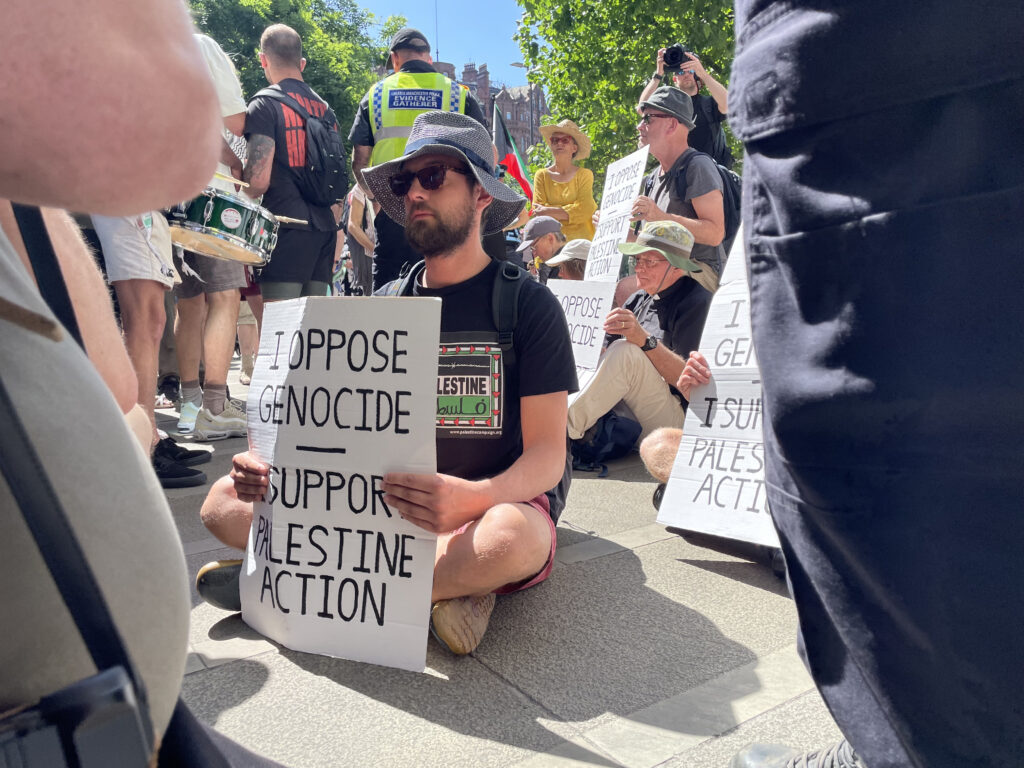
Policing peaceful protest
But the centre cannot withstand the police. Travelling back and forth between the sitters, I try to record events by kneeling beside them, capturing the wall of legs, the thundering sound, the ricochets of movement. At police line, where I attempt to document arrests, I am in close proximity to those in uniform. Despite obeying every order to retreat as more officers join the ranks, I am shoved by passing police just like everyone else.
At least one protestor that I spoke to, attending the scene to support a free Palestine, describes being assaulted by a police officer in an unprovoked attack. When watching back my recorded footage from the event, I see an officer grab them and thrust them to the ground by their head.
Making no effort to calm the situation, the police ignore numerous pleas from protestors for protection from far-right aggression. Rather than clear and maintain a path between their back line and the statue to ensure the sitters’ arrests are as safely managed as possible, police instead make sporadic, forceful dashes through the crowd to take sitters by storm.
Their choice is to drag, lift, or march every arrested demonstrator through large numbers of people who are either shoving with intent or stumbling in waves from being pushed. Protestors chant ‘Shame on you!’ as officers make arrest after arrest, and cry out with alarm at the force officers use to move the sitters (‘You’re hurting him!’). The far-right, meanwhile, laugh and talk into their cameras with satisfaction as police exert government-mandated power over people who peacefully hold cardboard placards.
Booked and loaded into waiting vans down an adjacent street, which is increasingly difficult to observe as the reinforced police line moves us ever closer to the statue, the demonstrators do not know where they will be taken, what they will be charged with, or when they will be released.
Under the Terrorism Act (2000), the arrested demonstrators can be detained for up to 72 hours without charge.
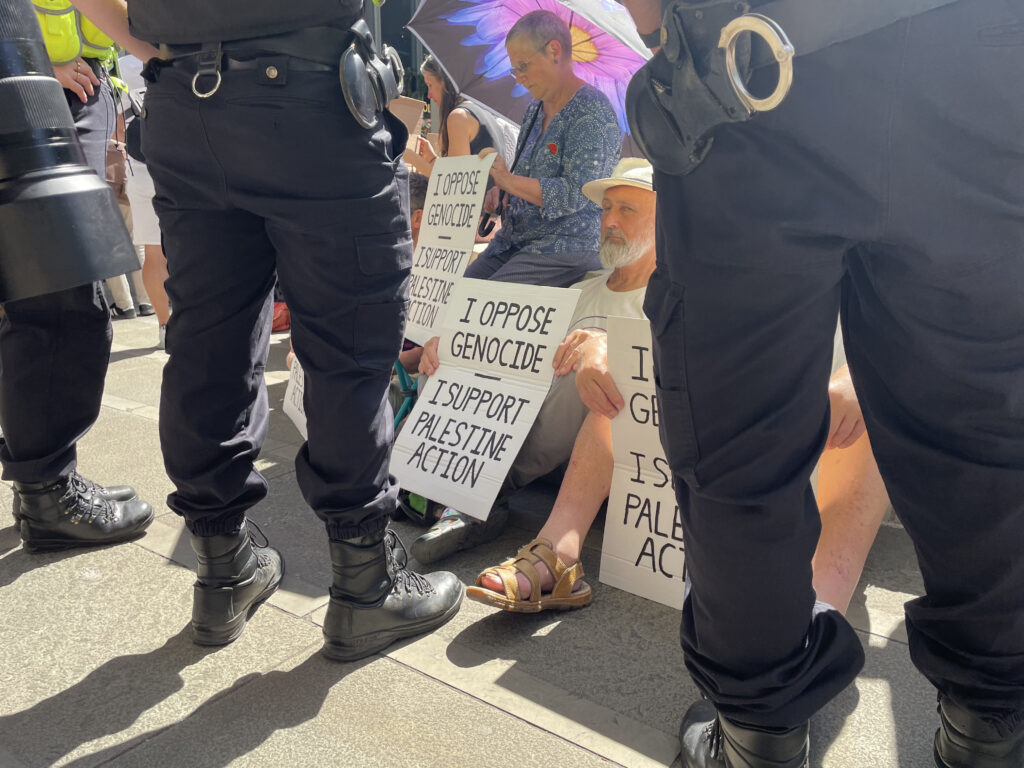
A question of freedom
Following the last sitter’s arrest—the police do not arrest anyone who has assaulted protestors—those gathered around the statues begin to disperse. Photos and videos appear online of other demonstrations across England, Wales, and Northern Ireland, which, without a Zionist or fascist element intervening, have passed more peacefully, despite arrests.
According to a BBC report, 71 people have been arrested by police under the Terrorism Act for their peaceful protests (following 29 others arrested in London last weekend) on the afternoon of July 12.
In one case, a solo demonstrator has had their house searched and laptop confiscated by officers. In a video posted on social media, he states his reasons for taking action. ‘Everything is back to front,’ he says. ‘Where tens of thousands of murdered children is “self-defence” and words on a placard is “terrorism”. We have a government in this country that is aiding and abetting a live genocide. When, in fact, they have a moral obligation to be taking concrete steps to stop it. We need these people in our society: people fighting for a fairer world. People holding to account people who abuse their positions of power. People like Palestine Action. What is left of our democracy when their voices are silenced?’
It is a question that every one of us should be discomforted by while those opposing what the United Nations explicitly calls a genocide face prosecution as terrorists – and while the UK government continues to support the Israeli government’s bombing of hospitals, schools, and libraries, their violent displacement of Palestinians, and murder of Palestinian people.
This account, then, is of the demonstrators who opposed genocide and supported Palestine Action on July 12, 2025; reports to date in the national or local presses have not covered details about the protest in Manchester beyond the number of arrests made. It is an account for all of us, too, of the rise of fascism under Keir Starmer’s Labour government in Britain, and the relationships between police, state, and far-right figures that fuel it.
